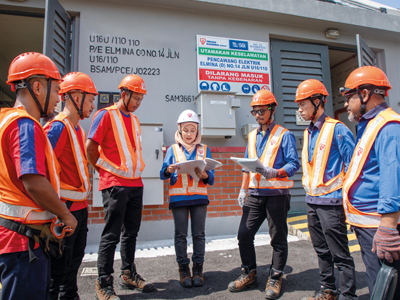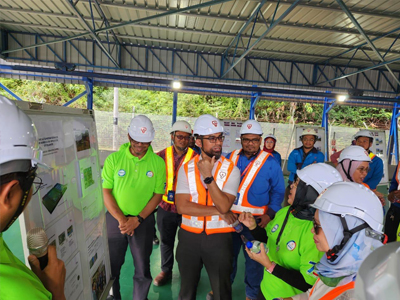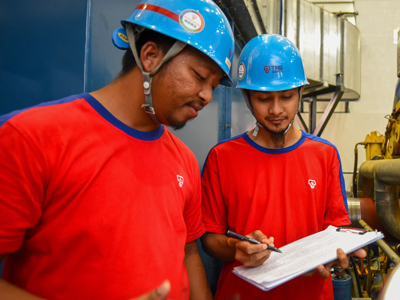In the pursuit of operational excellence and a sustainable future, Tenaga Nasional Berhad (TNB) has adopted the Safety & Excellence Management System (SEMS) as a cornerstone of its commitment to environmental, social, and governance (ESG) principles.
As part of this commitment, TNB started the Health, Safety, Environment Management System (HSEMS) in 2019 to effectively manage health, safety, and environmental (HSE) risks across TNB workplaces by aligning to international management system standards. This system supports the continuous improvement, integrating regulations, policies, procedures, processes, action plans, and strategic activities aimed at hazard control and risk minimization, including those related to environmental impacts.
In 2024, the company went one step further in its quest towards its employees’ safety and introduced the Revitalising Safety Excellence Management System (RSEMS) to address both safety and comfort at the workplace through a scoring methodology.
Aligned with TNB’s long-term ESG agenda and net-zero aspirations, RSEMS represents a strategic convergence of operational discipline and sustainability values. By safeguarding the wellbeing of its workforce and minimizing environmental risks, RSEMS supports broader goals such as:



How RSEMS Works: Building Safety from the Ground Up
RSEMS is to be implemented at TNB’s 229 stores and yards, ensuring each location adheres to Government regulations and internal HSE standards, while fostering a safe and comfortable workplace for employees. In essence, it serves as an internal audit system designed to prevent accidents, protect assets, and avoid losses from damage.
RSEMS evaluates how HSE performance is monitored, reported, and improved across TNB’s infrastructure. It introduces a formal audit framework that focuses on two core areas: technical HSE compliance and employee comfort. The system operates on a self-regulatory model, using a straightforward checklist that employees can easily apply at the stores and yards.
RSEMS follows a structured, top-down approach that begins with the HSE Committee and extends to the frontliners. At the highest level, the HSE Committee oversees the implementation of RSEMS and monitors the progress of improvement actions across the organization.
These actions are then managed by the HSE teams, who are responsible for updating relevant checklists and conducting independent assurance checks. The respective business entities ensure that audits are carried out in line with established guidelines, with qualified personnel appointed as REMS auditors.
At the operational level, local management at stores and yards conducts ease-impact assessments based on audit findings to identify and implement the necessary improvement measures. Progress on these actions is monitored and periodically reported to the HSE Committee until all issues are fully resolved.



The Two Components of Safety: Compliance and Employee Experience
In practice, the RSEMS audit consists of two main components. The first focuses on evaluating physical safety and assessing compliance with health and HSE requirements at TNB’s stores and yards, accounting for 80% of the total RSEMS audit score. This component involves both a physical inspection of the site and verification of relevant documentation.
The RSEMS checklist under physical safety includes 16 elements, covering a wide range of safety and operational topics — from fire and electrical systems to environmental management and first aid supplies. These are commonly applied criteria used in facilities such as stores and yards to ensure consistent safety and operational standards.
The second audit component focuses on Employee Experience, assessing the level of HSE comfort and awareness among TNB’s workforce. Contributing 20% to the overall RSEMS score, this component captures how employees perceive their working environment, including their sense of safety, access to emergency facilities, and the overall quality of workplace conditions. It emphasises the importance of ensuring employees feel safe, supported, and comfortable in performing their daily tasks. This approach reinforces TNB’s ESG commitment to employee well-being and the cultivation of a strong, caring safety culture across all operational areas..
Assessment is done through structured interviews with both management and employee representatives, guided by pre-set survey questions. Auditors will evaluate responses and assign scores accordingly.
For example, management may be asked if HSE rules and reporting channels are clearly communicated and available to all employees. Frontliners may be asked if they are aware of how to report damaged or unsafe equipment, and whether such issues are resolved effectively.
Final scores from both components determine a location’s overall rating. A total score of 91% and above earns a five-star rating, while anything below 61% results in a one-star rating.
Ultimately, this shows that RSEMS is more than just a compliance tool. It is an approach that covers a wide range of health, safety and environment aspects in TNB’s operations, and it is one that views this process as a proactive, transparent, and shared responsibility grounded in both systems and experience.
The Effects of RSEMS and Charting a Culture of HSE
In 2024, a total of 229 stores and yards audited under the RSEMS framework, in which, 48 received a five-star or “Excellent” rating. This was followed by 102 with four stars (“Good”), 65 with three stars (“Average”), eight with two stars (“Poor”), and six with one star (“Very Poor”).
| Rating | Stars | Number of Stores and Yards |
|---|---|---|
| Excellent | ★★★★★ | 48 |
| Good | ★★★★☆ | 102 |
| Average | ★★★☆☆ | 65 |
| Poor | ★★☆☆☆ | 8 |
| Very Poor | ★☆☆☆☆ | 6 |
As of June 2025, among those rated with two- or one-star rating, seven stores and yards have achieved 100% corrective action closure, while another seven are still in progress. The corrective actions mainly involve renovation works and housekeeping efforts aimed at improving workforce comfort.
The results indicate that while TNB upholds strong professional standards in inspection and safety compliance, there remain key areas requiring improvement. Although many sites are performing well, the structured review process has uncovered inconsistencies in meeting established expectations.
Without this exercise, several issues, ranging from minor oversights to critical gaps, may have remained undetected. The introduction of RSEMS has enabled TNB to more accurately identify potential risks and areas of non-compliance. With its implementation in 2024, TNB is now committed to conducting this audit annually across all stores and yards to drive continuous improvement and ensure consistent safety performance.
More importantly, the RSEMS audit process has reframed how workplace safety is approached. It recognises that a comfortable work environment directly influences safety outcomes. Even the most robust technical safeguards can fail if issues are overlooked or left unaddressed.
By incorporating the above components and employee experience into the audit process, RSEMS fills the missing link between policy and practice, and now serves as another cornerstone under TNB's broader environmental, social and governance (ESG) goals.
And it is a practice that we hope to make use of as part of the culture of improving our operations while maintaining the best services for our customers.